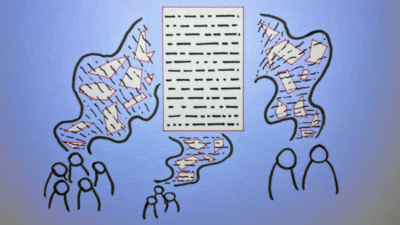Making sense of our connected world
Online echoes: the Tagesschau in Einfacher Sprache
How is the Tagesschau in Einfacher Sprache perceived? This analysis of Reddit comments reveals how the new simplified format news is discussed online.
Opportunities to combat loneliness: How care facilities are connecting neighborhoods
Can digital tools help combat loneliness in old age? Care facilities are rethinking their role as inclusive, connected places in the community.
Unwillingly naked: How deepfake pornography intensifies sexualised violence against women
Deepfake pornography uses AI to create fake nude images without consent, primarily targeting women. Learn how it amplifies inequality and what must change.
Platform governance
Platform Governance refers to the rules, regulations, and framework within which digital platforms in our society are managed. This includes social networks, online services, digital marketplaces, or messaging services, for example. These digital platform ecosystems facilitate the exchange of information, goods, and services in our daily lives. As an integral part of our modern communication, they also have a profound impact on public discourse and economic processes. In our research on sustainable platform governance, we therefore examine how entrepreneurial goals, individual rights, and societal values can be harmonised in these online communication spaces. This includes questions related to online platform regulation, competition law, freedom of speech, individual autonomy, and (democratically anchored) decision-making.
Artificial intelligence with purpose: Mapping the landscape of public interest AI
How is AI being used for the common good? A new dataset is mapping the landscape of public interest AI by cataloguing impactful projects worldwide.
Who hired this bot? On the ambivalence of using generative AI in recruiting
Generative AI in recruiting promises efficiency, but may also quietly undermine the human connection that HR decisions and candidate fit rely on.
Polished yet impersonal: The unintended consequences of writing your emails with AI
AI-written emails can save workers time and improve clarity – but are we losing connection, nuance, and communication skills in the process?
AI at the microphone: The voice of the future?
From synthesising voices and generating entire episodes, AI is transforming digital audio. Explore the opportunities and challenges of AI at the microphone.
Do Community Notes have a party preference?
This article explores whether Community Notes effectively combat disinformation or mirror political biases, analysing distribution and rating patterns.
How People Analytics can affect the perception of fairness in the workplace
People Analytics in the workplace can improve decisions but may also heighten feelings of unfairness, impacting employee trust and workplace relationships.
What could German digital policy look like after the Bundestag election?
What are the digital policy positions of Germany’s parties for the 2025 Bundestag election?
Do Alice Weidel and the AfD benefit from Musk’s attention on X?
Elon Musk has expressed support for Alice Weidel, while her reach on X has grown significantly. Could these developments be connected?
Science hostility: What we know and what we can do about it
The KAPAZ project supports researchers facing science hostility with communication training, institutional resources, and initiatives to raise awareness.
Why access rights to platform data for researchers restrict, not promote, academic freedom
New German and EU digital laws grant researchers access rights to platform data, but narrow definitions of research risk undermining academic freedom.
Empowering workers with data
As workplaces become data-driven, can workers use people analytics to advocate for their rights? This article explores how data empowers workers and unions.
Two years after the takeover: Four key policy changes of X under Musk
This article outlines four key policy changes of X since Musk’s 2022 takeover, highlighting how the platform’s approach to content moderation has evolved.
Between vision and reality: Discourses about Sustainable AI in Germany
This article explores Sustainable AI and Germany’s shift from optimism to concern about its environmental impact. Can AI really combat climate change?
One step forward, two steps back: Why artificial intelligence is currently mainly predicting the past
While AI is seen as technology of the future, it often relies on historical data. This blog post examines how AI can reproduce social inequalities and bias.
Between time savings and additional effort: Generative AI in the workplace
Generative AI in the workplace is enhancing productivity, yet employees face mixed results. This post examines chatbots’ paradoxical impact on efficiency.
Resistance to change: Challenges and opportunities in digital higher education
Resistance to change in higher education is inevitable. However, if properly understood, it can contribute to shaping digital transformation constructively.
From theory to practice and back again: A journey in public interest AI
This blog post reflects on our initial Public Interest AI principles, using our experiences from developing Simba, an open-source German text simplifier.
Mobility transition in the neighbourhood: Simulating citizen participation in Berlin’s digital administration
How can data and digital solutions drive urban development? In the living lab, we tested citizen participation within Berlin’s digital administration.































